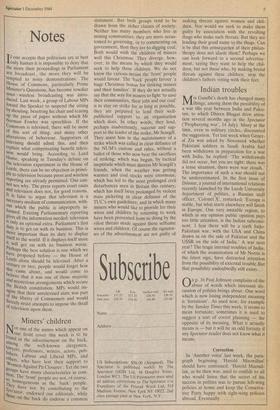Notes
If one accepts that politicians are at best
only human it is impossible to deny that the more their proceedings in Parliament are broadcast, the more they will be tempted to noisy demonstrations. The House of Commons, particularly Prime Minister's Questions, has become rowdier since wireless broadcasting was intro- duced. Last week, a group of Labour MPs forced the Speaker to suspend the sitting by shouting, besetting his chair and tearing up the piece of paper without which Mr Norman Fowler was speechless. If the Commons is televised, there will be more of this sort of thing, and many other alterations of behaviour. Supporters of televising should admit this, and then explain what compensating benefit televi- sion would bring. According to Lord Home, speaking in Tuesday's debate on the television experiment in the House of Lords, there can be no objection in princi- Pie to television because press and wireless reporting are already permitted. One can- not see why. The press reports court cases and television does not, for good reasons. It is false to argue that television is a necessary medium of communication, with- out which the public is improperly formed. Existing Parliamentary reporting gives all the information needed: television 18 only an optional extra. Parliament's first duty is to get on with its business. This is 111. °re important than its duty to display itself to the world. If it displays itself more Willget on with its business worse. Perhaps the best solution is one which we have proposed before — the House of Lords alone should be televised. After a century or two, people would forget how it:us came about, and would come to , believe that it was one of those majestic the mysterious arrangements which secure "'le British constitution. MPs would im- agine that their untelevised state was part ff the liberty of Commoners and would ercely resist attempts to impose the thrall of television upon them.






















































 Previous page
Previous page